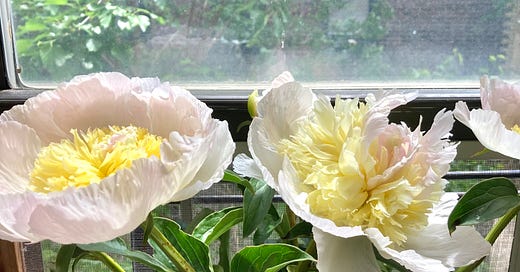It is hard to talk about pleasures this howling week. You don’t need me to be yet another person urging you (Americans) to call your senators and sign petitions and send money to Everytown and Sandy Hook Promise. Do this, of course, if you can. But in between crying jags in the kitchen I have needed this week to remind myself that devoting attention to horror is not, by itself, a moral act. It’s hard to remember that, given the volume of the argument that the worst thing you can be in the world is ignorant of some suffering. By extension, goes the logic of both traditional and social media, if you haven’t seen the horrifying thing, consumed it, commented on it, you haven’t done your duty as a citizen, or as a human. So it can feel radical to remember that it doesn’t matter to anyone if you watch the video (or the other video, or the other one) or share the picture. There’s nobody keeping score.
For me, this week, it has helped to be aware of my attention, to be deliberate about the places my imagination is going, and to take charge of it, as far as I can. The thing is, we are ignorant of so much suffering, all the time, everywhere in the world. And so much joy! Even though it feels like our news feeds are a firehose, of course they aren’t—they’re a trickle of filtered experiences, a few pages from a few books in a library the size of the whole world. And it’s okay to walk away.
Small things help
I went for a run yesterday, for the first time in a little while, on a beautiful, sunny, breezy day. I let my eyes open wide, stretching them on purpose to soak up all the greens, all the blues, all the light; the river, the bridges, the air, the people, the path. The boats! To just be astonished anew by the world, the way my kid is: look at that, look at that, look at that. Running is also, of course, for biological reasons I don’t fully understand, an excellent bringer-up and wringer-out of emotions.
Then, too, I talked to my friend S, one of the little group to whom my book is dedicated, and we raged a bit together and then we talked about other things, my book, her family, her extremely exciting new job. I made some good dinners—shrimp linguine with lemon and garlic, pretty close to this Ina Garten recipe, and mustardy pork chops with new potatoes and creamed kale (cook the shredded kale down gently in a lidded pot with lots of salt, oil, and balsamic vinegar, then splash in some cream at the end.)
These peonies on the windowsill opened up lavishly, barely-pink petals offering up big, frilled, buttery hearts, and I start to see why they become an obsession.
And I picked up Mavis Gallant’s A Fairly Good Time, her 1970 novel about a young Canadian wife adrift in Paris. So far it’s twisty and bleak and weird in the way that stories are when their details are utterly specific, and I’m in awe of the way the narrative ricochets between the minuscule and the existential. Here’s the opening of chapter two:
The building across the courtyard must have been removed by someone playing with bricks, for the light of morning, which had been suppressed until now, blazed through a gap in the bedroom curtains, shot along a wall, set on fire a mirror framed in snapshots, notes, post-cards, out-of-date reminders to and from Philippe, and revealed a small scarlet translucent spider hanging on a rope of the stoutest silk. A milder luminosity—of imagination this time—surrounded the two middle-aged persons cycling steadily up an English hill. In homage to morning and to the splendor of new beginnings, they carried an offering of blue, but the blue was perishable. It turned to indigo. The petals rotted. The flower fragrance altered and resembled the scent of the aging lovers, of soap and of death.
My writing elsewhere
I’m in the unusual position of directing you, this week, to two PRINT magazines. Okay, not yet, actually, but soon (probably mid-late June). I’ll be in the summer issues of both Bust and the New Republic, the first as a featured book (!!) and the second as a reviewer, of Julie Phillips’s excellent and absurdly-relevant-to-me nonfiction book about mothering and making art, The Baby on the Fire Escape. So, you know, take out subscriptions, buy digital copies, or venture out and find a newsstand?
I hope your long weekends are restful and full of sunshine. If you need us, we’ll be riding the ferry.
You can check out all my recent writing on my website, www.joannascutts.com. I hate the tyrannical hold that paid subscriptions have over our lives (but I love hyperbole) so I don’t and never will charge for this newsletter. The best way to support my writing is by buying my books, but if you’re so moved, a coffee would also be delightful. Thank you!





